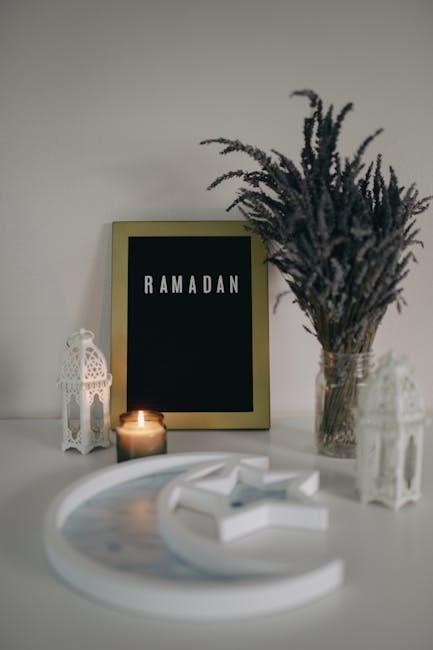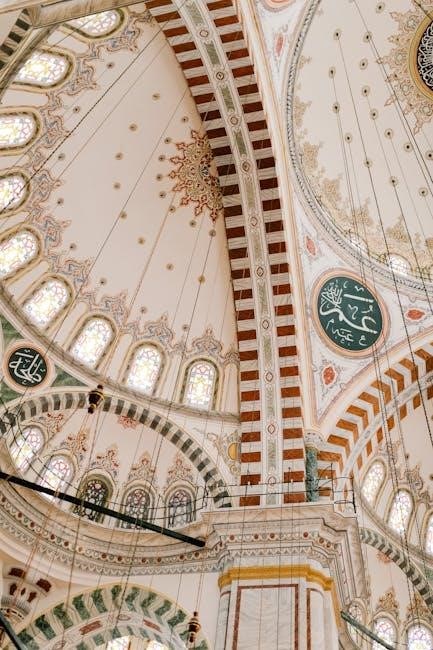Ramadan is a sacred month of fasting‚ reflection‚ and spiritual growth. Dua‚ or supplication‚ is a vital practice‚ allowing believers to connect with Allah‚ seeking mercy‚ forgiveness‚ and guidance throughout the holy month.
What is Ramadan?
Ramadan‚ the ninth month in the Islamic calendar‚ is a sacred period of fasting‚ spiritual reflection‚ and heightened devotion for Muslims worldwide. It commemorates the revelation of the Quran to Prophet Muhammad (peace be upon him) and is one of the Five Pillars of Islam. During Ramadan‚ Muslims abstain from food and drink from dawn to sunset‚ known as sawm‚ to cultivate self-control‚ empathy for the needy‚ and a deeper connection with Allah. The month is also marked by increased acts of worship‚ such as reciting the Quran‚ performing Tarawih prayers‚ and engaging in charity. Ramadan concludes with Eid al-Fitr‚ a joyous celebration marking the end of fasting. The month is divided into three phases‚ each with unique blessings and spiritual focus‚ making it a transformative experience for believers.
The Importance of Dua in Ramadan
Dua‚ or supplication‚ holds immense significance in Ramadan‚ as it serves as a direct means of communication with Allah. This blessed month is a time when dua is more likely to be accepted‚ as Allah’s mercy and forgiveness are at their peak. Muslims are encouraged to engage in frequent and sincere dua‚ seeking forgiveness‚ guidance‚ and spiritual growth. The Prophet Muhammad (peace be upon him) emphasized that Ramadan is a month of mercy‚ forgiveness‚ and freedom from the Fire‚ making it an ideal time for supplication. By incorporating specific Ramadan duas‚ believers can deepen their connection with Allah and seek His blessings in all aspects of life; Consistent and heartfelt dua also fosters a sense of humility and gratitude‚ enriching the spiritual experience of fasting and worship during Ramadan. This practice strengthens faith and brings believers closer to Allah’s divine grace.

Daily Ramadan Dua List
A structured collection of supplications for each day of Ramadan‚ focusing on themes like mercy‚ forgiveness‚ and gratitude‚ available in PDF with English translations and Quranic references.
Dua for Day 1: Mercy
On the first day of Ramadan‚ believers are encouraged to seek Allah’s mercy and blessings. The recommended dua is: “Yaa Arhamar Rahimeen‚ irhamnaa wa ajir lanaa min al-nar” (Oh Most Merciful of the merciful‚ have mercy on us and protect us from the Fire). This supplication emphasizes the importance of asking for divine compassion and protection‚ setting a spiritual tone for the month ahead. Reciting this dua with sincerity helps believers reconnect with Allah and seek His forgiveness. It is often recited after the morning prayer or before breaking the fast‚ fostering a mindset of humility and gratitude. This practice is a beautiful way to begin Ramadan‚ focusing on Allah’s infinite mercy and grace.
Dua for Day 2: Forgiveness
On the second day of Ramadan‚ the focus shifts to seeking forgiveness for past sins. A recommended dua is: “Allahumma ighfir li dhanbi kullahu‚ diqqahu wa jallahu‚ awwalahu wa aakhirahu‚ sirrahu wa alaniyatahu” (Oh Allah‚ forgive all my sins‚ the small and the great‚ the first and the last‚ the secret and the open). This supplication highlights the importance of repentance and seeking divine pardon. Reciting this dua encourages believers to reflect on their actions and seek mercy. It is often recited after the evening prayer or during quiet moments of reflection. By seeking forgiveness‚ believers strengthen their relationship with Allah and purify their hearts. This practice aligns with Ramadan’s spirit of self-improvement and spiritual renewal‚ reminding us of the necessity of humility and seeking divine grace.
Dua for Day 3: Breaking Fast
The third day of Ramadan focuses on the dua for breaking the fast‚ known as dua for iftar. The recommended supplication is: “Allahumma inni laka sumtu‚ wa bika aamantu‚ wa alayka tawakkaltu‚ wa Ala rizqika aftartu” (Oh Allah‚ I fasted for You‚ believed in You‚ trusted in You‚ and broke my fast with Your provision). This dua expresses gratitude for Allah’s blessings and acknowledges His sustenance. It is recited immediately after breaking the fast‚ typically before eating or drinking. The practice of reciting this dua is rooted in the Sunnah and emphasizes the importance of thanking Allah for His mercy. By reciting this supplication‚ believers cultivate a sense of humility and appreciation‚ aligning with the spiritual goals of Ramadan. This moment is also considered ideal for seeking divine forgiveness and blessings.
Dua for Day 4: Guidance
On the fourth day of Ramadan‚ the focus shifts to seeking divine guidance through a heartfelt dua. The recommended supplication is: “Allahumma arinal haqaqa haqqan wa atba` al-sadiqa sadaqan” (Oh Allah‚ show us the truth as truth and help us follow the truthful). This dua emphasizes the believer’s desire to be guided on the right path and to discern truth from falsehood. It aligns with the spiritual objectives of Ramadan‚ fostering self-reflection and a deeper connection with Allah. Reciting this dua encourages believers to seek clarity in their actions and decisions‚ ensuring their deeds align with Islamic teachings. By invoking Allah’s guidance‚ one strengthens their faith and commitment to a righteous lifestyle. This practice‚ rooted in the Sunnah‚ highlights the importance of seeking divine assistance in navigating life’s challenges.
Dua for Day 5: Gratitude
On the fifth day of Ramadan‚ the focus is on cultivating gratitude through a heartfelt dua. The recommended supplication is: “Alhamdu lillahilladhi bi ni’matihi tatimmus saalihaat” (All praise is for Allah‚ by whose grace all good deeds are completed). This dua emphasizes thanking Allah for His blessings and acknowledging His mercy in facilitating acts of worship during Ramadan. Gratitude is a fundamental aspect of faith‚ and this dua encourages believers to reflect on the blessings they often take for granted. By expressing appreciation‚ one strengthens their relationship with Allah and fosters a sense of contentment. This practice‚ rooted in Islamic teachings‚ reminds believers to remain humble and thankful for the opportunity to fast and seek spiritual growth. Incorporating this dua into daily supplications enhances the overall Ramadan experience.
Ramirez Ashra Dua List
The Ramirez Ashra Dua List categorizes supplications into three phases of Ramadan‚ focusing on mercy‚ forgiveness‚ and seeking freedom from the Fire‚ each with specific duas and reflections.
First 10 Days: Mercy
The first 10 days of Ramadan are dedicated to seeking Allah’s mercy and blessings. This period is a time for reflection‚ repentance‚ and reconnecting with one’s faith. Believers are encouraged to invoke Allah’s mercy through specific duas‚ such as “O Allah‚ have mercy on me” (Rabbi ighfir li)‚ which is a simple yet powerful supplication. These days emphasize the importance of sincerity and humility in one’s worship. Many Muslims use the Ramadan Dua List PDF to guide their supplications‚ ensuring they cover essential aspects of their spiritual journey. The PDF often includes Arabic text‚ English translations‚ and explanations to help believers understand the significance of each dua. By focusing on mercy during these days‚ individuals can set a positive tone for the rest of the holy month and seek Allah’s forgiveness with heartfelt devotion. Regular recitation of these duas‚ especially after daily prayers and in nightly Ramadan prayers‚ is highly recommended for maximum spiritual benefit.
Second 10 Days: Forgiveness
The second 10 days of Ramadan focus on seeking forgiveness and purification. This period emphasizes repentance and asking Allah to pardon past mistakes. Believers are encouraged to recite specific duas‚ such as “O Allah‚ You are Oft-Pardoning and You love to pardon‚ so pardon me” (At-Tirmidhi). The Ramadan Dua List PDF often includes supplications tailored for this phase‚ guiding individuals in their quest for forgiveness. These duas highlight the importance of sincerity and humility in seeking Allah’s mercy. Many Muslims also engage in additional prayers and recitations of the Quran during this time to strengthen their connection with Allah. By prioritizing forgiveness‚ believers aim to cleanse their hearts and minds‚ preparing themselves for the final 10 days of Ramadan. Regular reflection and supplication during this period are essential for spiritual growth and renewal. The PDF serves as a valuable resource‚ offering structured and meaningful supplications for seekers of divine pardon.
Last 10 Days: Seeking Freedom from Fire
The last 10 days of Ramadan are a time of intense devotion‚ with a focus on seeking freedom from the Fire. Muslims often recite specific duas‚ such as “A’ūdhu billāhi min al-nāri” (I seek refuge in Allah from the Fire)‚ to express their desire for divine protection. The Ramadan Dua List PDF includes supplications tailored for this phase‚ emphasizing repentance and the pursuit of salvation. These duas highlight the urgency of seeking Allah’s mercy and forgiveness‚ as the final days of Ramadan are considered a period of immense blessings and forgiveness. Many believers also spend extra time in worship‚ reciting the Quran‚ and performing optional prayers like Tahajjud. The PDF serves as a guide‚ offering structured supplications to help believers focus their efforts and sincerely ask Allah to grant them refuge from the Fire. This period is a powerful opportunity for spiritual reflection and seeking divine pardon.

Duas from the Quran and Sunnah
Duas from the Quran and Sunnah are essential for Ramadan‚ providing authentic supplications for seeking mercy‚ forgiveness‚ and guidance. The structured PDF lists these prayers‚ enhancing worship during the holy month.
Quranic Duas for Ramadan
Quranic Duas for Ramadan are powerful supplications extracted directly from the Holy Quran‚ offering believers a meaningful way to connect with Allah during the holy month. These verses‚ rich in spiritual significance‚ provide guidance for seeking mercy‚ forgiveness‚ and divine assistance. Many of these Duas are recited during specific moments‚ such as before breaking the fast or during late-night prayers. For example‚ the Dua from Surah Al-Baqarah (2:186) emphasizes trust in Allah’s response to supplications‚ while Surah Al-Imran (3:147) highlights gratitude and seeking divine favor. The structured PDF list organizes these verses‚ making it easier for Muslims to incorporate them into their daily worship routines. By reciting Quranic Duas‚ individuals can deepen their faith‚ enhance their worship‚ and align their supplications with the divine words of the Quran.
Sunnah Duas for Ramadan
Sunnah Duas for Ramadan are supplications rooted in the teachings and practices of the Prophet Muhammad (SAWS)‚ offering believers a way to emulate his worship during the holy month. These Duas‚ passed down through authentic Hadith‚ provide guidance for various moments in Ramadan‚ such as breaking the fast‚ starting the fast‚ and seeking Laylatul Qadr. For example‚ the Prophet (SAWS) would recite specific prayers before and after fasting‚ emphasizing gratitude and seeking divine mercy. The Dua for breaking the fast‚ “Allahumma inni laka sumtu‚” is a well-known Sunnah practice. These Duas‚ compiled in the Ramadan Dua List PDF‚ help Muslims align their supplications with the Sunnah‚ fostering a deeper connection to the Prophet’s traditions. By incorporating these prayers‚ individuals can enhance their spiritual practices during Ramadan‚ seeking forgiveness and blessings in accordance with Sunnah guidance.

Special Duas for Ramadan
Special Duas for Ramadan include prayers for breaking the fast‚ Sehri‚ and Lailatul Qadr. These unique supplications‚ found in the Ramadan Dua List PDF‚ enhance spiritual practices during key moments.
Dua for Breaking Fast
The Dua for breaking fast‚ known as Dua Iftar‚ is a heartfelt supplication recited upon ending the fast. The recommended Dua is:
Allahumma inni laka sumtu‚ wa bika aamantu‚ wa alayka tawakkaltu‚ wa Ala rizqika aftartu.
Translation: “O Allah‚ I fasted for You‚ believed in You‚ and relied on Your provision. I break my fast with Your sustenance.”
This Dua expresses gratitude for Allah’s blessings and seeks His mercy. It is advisable to recite it immediately after breaking the fast‚ before eating or drinking. Many Muslims also add personal supplications‚ seeking forgiveness and blessings during this blessed moment. The Dua for breaking fast is a beautiful way to connect with Allah and reflect on His grace throughout Ramadan.
Dua for Sehri
The Dua for Sehri‚ also known as the pre-dawn meal‚ is a supplication recited before starting the fast. The recommended Dua is:
Wa bisawmi ghadin nawaiytu min shahri Ramadan.
Translation: “I intend to fast tomorrow in the month of Ramadan.”
This Dua signifies the intention to fast‚ emphasizing commitment and mindfulness. It is recited right before dawn‚ as the fast begins. Many Muslims also add personal supplications‚ seeking strength‚ health‚ and spiritual focus for the day ahead. The Dua for Sehri is a simple yet powerful way to begin the day with gratitude and devotion‚ setting a positive tone for the fasting period. It reminds believers of the sacredness of Ramadan and the importance of intention in worship.
Dua for Lailatul Qadr
Lailatul Qadr‚ the Night of Decree‚ is a blessed occasion in Ramadan‚ often occurring in the last ten days. The Quran describes it as greater than a thousand months. A recommended Dua for this night is:
Translation: “Allah is the Greatest‚ all praise is for Allah‚ and glory be to Allah.” Muslims also recite the Dua from Surah Al-Qadr: Meaning: “We have indeed revealed it in the Night of Decree. And what will make you know what the Night of Decree is? It is peace until the break of dawn.” Additionally‚ the Sunnah includes supplications like: Meaning: “O Lord‚ forgive and have mercy‚ for You are the Best of the merciful.” These Duas reflect the essence of seeking forgiveness‚ blessings‚ and divine mercy on this sacred night. Many Muslims also engage in prolonged prayer and recitation of the Quran‚ making it a time of deep spiritual connection. The Dua for Lailatul Qadr emphasizes gratitude‚ humility‚ and the pursuit of divine grace‚ encapsulating the spiritual significance of the occasion. Download the PDF‚ access daily Duas‚ and recite them with sincerity. Organize your supplications‚ track progress‚ and enhance your spiritual journey during Ramadan with this convenient resource. Downloading the Ramadan Dua List PDF is a straightforward process. Simply visit a reputable website offering the resource and click the download link provided. Ensure the source is trustworthy to guarantee authenticity and clarity of the content. Once downloaded‚ the PDF can be accessed on any device‚ making it convenient for daily use. The document is often free and easily printable‚ allowing you to carry it with you or share it with others. Many PDFs include Arabic text‚ English translations‚ and transliterations‚ catering to diverse needs. By downloading the PDF‚ you gain a structured guide to supplications‚ organized by days or themes‚ enhancing your spiritual practice during Ramadan. This resource is invaluable for those seeking to deepen their connection with Allah through meaningful Dua. The Ramadan Dua List PDF offers numerous benefits‚ making it an essential tool for spiritual growth during the holy month. It provides a structured and organized collection of supplications‚ categorized by days or themes‚ ensuring ease of access and recitation. The PDF often includes Arabic text‚ English translations‚ and transliterations‚ catering to believers of all language proficiency levels. This resource encourages consistency in daily Dua practice‚ helping individuals stay focused and connected to Allah. Additionally‚ the PDF serves as a convenient guide for learning authentic supplications from the Quran and Sunnah‚ enhancing the depth of one’s worship. By using the PDF‚ believers can maximize the spiritual rewards of Ramadan‚ fostering a deeper sense of devotion and mindfulness throughout the month. To make your supplications more impactful‚ start by praising Allah and sending blessings upon the Prophet Muhammad (SAWS). Be sincere and focused‚ ensuring your heart is fully engaged in the prayer. Use Allah’s Beautiful Names that align with your request‚ such as Ar-Rahman (The Most Merciful) for seeking mercy. Prioritize areas like forgiveness‚ guidance‚ and gratitude‚ as these are central to Ramadan’s spirit. Recite supplications from the Quran and Sunnah‚ as they are divinely inspired and more likely to be accepted. Make your du’a specific and avoid vague requests‚ allowing Allah to understand your needs clearly. Incorporate recommended times for du’a‚ such as during suhoor‚ iftar‚ and the last third of the night. Consistency is key—maintain your du’a practice daily and seek forgiveness frequently. Finally‚ trust in Allah’s wisdom and timing‚ knowing He always responds in the best way. Ramadan offers a unique opportunity to deepen your spiritual connection through heartfelt du’a. Utilize the Ramadan Dua List PDF as a guide to seek Allah’s mercy‚ forgiveness‚ and guidance effectively. Ramadan is a blessed month of spiritual renewal‚ and du’a is a powerful tool to strengthen your connection with Allah. Consistently reciting daily Ramadan du’as‚ especially from the PDF list‚ helps cultivate gratitude‚ forgiveness‚ and guidance. These supplications‚ rooted in the Quran and Sunnah‚ provide a structured way to seek Allah’s mercy and blessings. Remember‚ sincerity and focus are key to making your du’as impactful. The Ramadan Dua List PDF serves as a valuable resource to organize and reflect on your supplications‚ ensuring you make the most of this sacred month. May your du’as be accepted‚ and may Ramadan bring you closer to Allah’s divine grace and peace. Embrace this opportunity to seek forgiveness‚ guidance‚ and strength for the year ahead. Ameen.
How to Use the Ramadan Dua List PDF
Downloading the PDF
Benefits of Using the PDF
Tips for Effective Dua
Final Thoughts on Ramadan Duas

